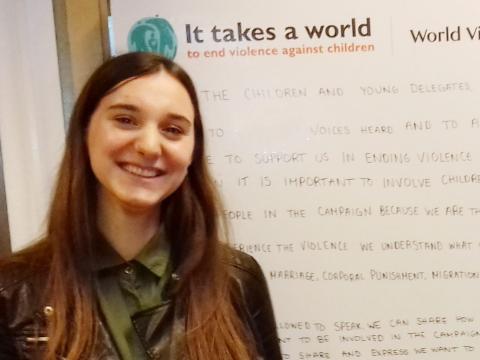Violence, a form of education in Albania

By Ermenda, 16, Young Leader from Albania
I would like to share with you some very sad stories of Albanian children, which are true and also widespread throughout my country. I come from a village in one of the poorest regions of Albania and others call us “Maloke” which means people who live in mountains. But actually, it is used to describe us as "wild people." And you know what, it might be true, but not only for my village, nor my city. Many Albanian parents, teachers, neighbours, friends, etc. act like wild people towards children.
The northern part of Albania has always been known for its patriarchal model of the family, where children not only weren’t allowed to speak for themselves, to express opinions, but also were beaten hard as a form of learning to obey and respect adults, or as a punishment for bad behaviour. It is painful to say that even in 2018 this is common in children’s lives.
World Vision Albania’s survey with children and parents in 2017 revealed that at the national level 68.2 per cent of children reported to have experienced a form of violence during the year. This percentage is 79.9 per cent for Dibra, where I come from. Imagine, that eight out of ten children are abused where I live. So what should I, you, us or any other person expect for the future of the society? Building it up on another damaged and violated generation, who learn to live only by violating and who will continue to do that with their children?
Alexander, a 14-year-old boy shared his experience of violence at school with me:
One day the teacher asked me a question. I knew the answer but at the time, I just couldn’t remember it. Then she started offending me, saying I was stupid and many other words. She even banged my head on the blackboard. All of this happened in front of my class and I saw that some of them were laughing. I didn’t want to be there at that moment and experience the feeling of being humiliated and ignored in front of 20 other children. I just wanted to cry but in our area it’s a shame for us boys to cry, it means we are weak.
This is the reality we Albanian children live in today. We know that what others do to us is not fair, yet we don’t raise our voices because we think that sharing what we think is wrong. This is because of how we have been raised and what we have been told. Telling someone not to beat me because of the shame, telling someone to not violate my rights- it is not normal in our culture. To tell someone you have no right to do this to me, actually may actually aggravate their behaviour.
But, the time has come for all of us to change. We have to change the way we act, the way we think and the way we stand, because child abuse must end once and for all. There are laws, politics and covenants that say so. We all must understand that nobody has the right to touch us - with his finger or with his word and if somebody does this, the law defines it is punishable. So, how come we act as if we are above the law?